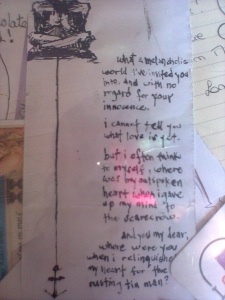“He explained to me with great insistence that every question posessed a power that did not lie in the answer.” ― Elie Wiesel, Night
I’ve been asking a lot of questions lately. Me having started to write has made me realize how much I don’t know and how much it scares me. About relationships. Responsibility. Time. Life.
Am I worth it? How do I take charge of my own life? What am I supposed to be doing right now? What do I need to do to achieve x? And how can I make sure it doesn’t lead to y? Where’s the line between courage and foolishness? How do I make my life meaningful? How do I gain confidence in myself and my life? When will I figure it out? Am I even asking the right questions?
This is just a fraction of what has been running through my mind lately. And I can’t seem to stop, which is driving me a bit crazy to be honest. And not in the Britney Spears hit song kind of way.
I’ve started to assume that there is meaning in everything – and if the meaning is not clear to me, then I just don’t get it. But I want to get it. Really badly.
I’ve realized that writing essays like these and poems isn’t a way for you to answer life’s many questions, but ask them. If you have been reading my blog posts, it might have been infuriating to you how I never really come to a sound conclusion, and have more questions than arguments for my viewpoint.
It has been to me at least. Realizing that asking all these new questions about myself and life doesn’t mean life will reward me with an answer because of my creativity with thinking up the question. I guess it’s a sense of entitlement I have to get over. I know I have to find my own answers, but how? what will they be? when and what must I go through to figure it all out – and at what cost? will I ever figure it out?
See? Whatever the subject I start thinking about, I just end up asking more questions.
Maybe the power has always been in the questions, not the answers. Maybe questions don’t always exist to be answered, but to be asked. After all didn’t Scott Westerfield say that the best books are the ones that ask the best questions, and bad readers are the ones who want everything answered? Maybe that applies to life too.
I always told my friends to ravel in the chaos and uncertainty of life. But I’ve realized the advice you give can be the hardest to follow through yourself.
I guess it’s all about accepting that you’ll never be able to have a full life by putting everything in neat little boxes and maps that show the way from A to B is so much harder than it seems. I guess the only map you’ll ever be able to draw of your life is the one that shows the path you already have completed. But that’s exactly what’s so hard to accept. And what’s so scary to accept, because you realize you have had the responsibility all along and always will.
But I didn’t just write this post to complain about wanting to fathom the unfathomableness of life, but to make a promise to myself and anyone reading this.
I’m going to create.
I’m going to create to keep me occupied and try to focus on less questions at a time. There might not be anything wrong with feeling and thinking, but letting it take you over to the point where you’re going crazy with anxiety is probably not a good thing either.
And to use these damned questions in my head to their full advantage. To understand them better and to create good poems, stories, songs – whatever. Anything.
And to keep you updated, I am currently working on a video to my poem “Star” (renamed from “Exploding Star”. I’ll post it as soon as I finish it, which hopefully is going to be in a couple of days. Which might mean that there’ll be less blog entries until then.
What questions are driving you crazy and how do you deal?
P.S.: Thank you for the support so far. You guys are the metaphorical answers to my questions.
